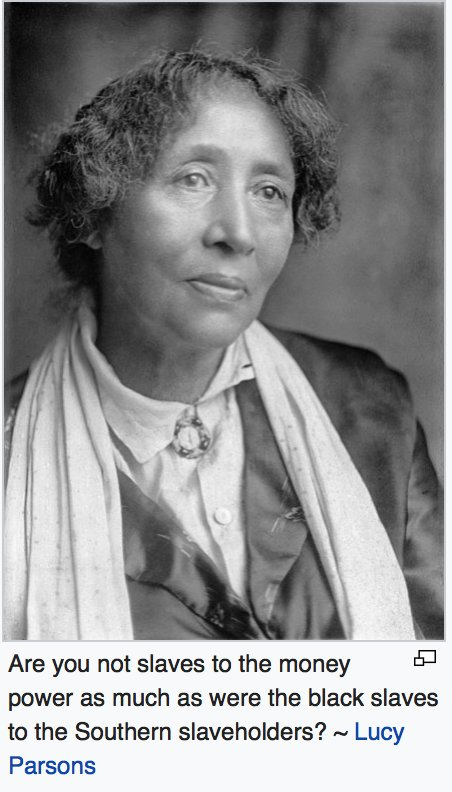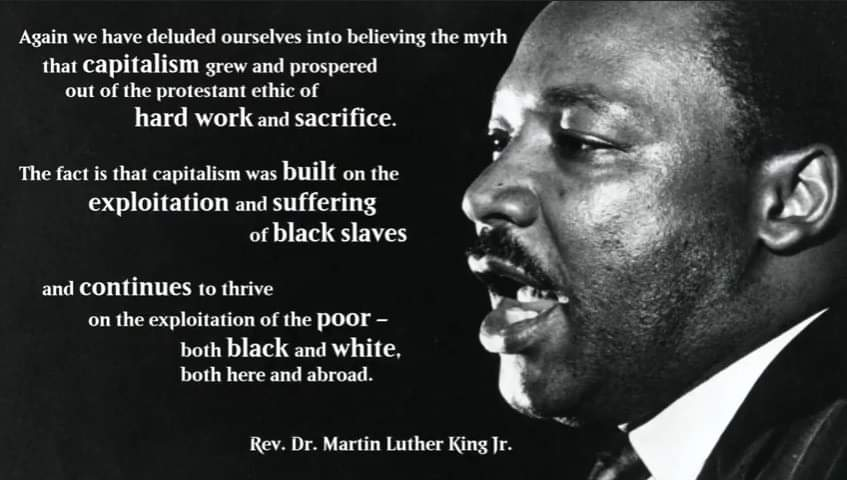Apparently we're debating whether or not the term "wage slavery" is racist. @Nessanihil posted these of Lucy Parsons, Frederick Douglass, and Dr. King, which give you a sense of how some Black radicals have talked about it. I want to say more about Douglass' in particular. 1/18
This quote from Douglass comes from an address he gave to the National Convention of Colored Men in 1883. According to historian Sumner Eliot Matison, the Civil War economy (1861-1865) had raised costs of living faster than it raised wages. The result: way more unions. /2
By the end of the Civil War, the number of local trade unions tripled, plus a huge increase in national unions. One, the National Labor Union, announced in 1866 that it would admit members of all races, but either wasn't willing or able to enforce this on its local chapters. /3
In response, Black workers - many of them newly emancipated from chattel slavery - formed the Colored National Labor Union. In 1872, Frederick Douglass was selected as its president. All to say, Douglass had already spent quite some time and energy on class politics by 1883. /4
By 1883 - less than two decades after the culmination of the Civil War, and almost certainly speaking to an audience that included people who had been enslaved in the chattel system - Douglass used the language of wage slavery that you see in the 1st post. But there's more. /5
Douglass is not naive. The situation as he describes it: "It is our lot to live among a people whose laws, traditions, and prejudices have been against us for centuries", so don't expect that "they are free from these evils because they have changed their laws". /6
Nevertheless, in the next section of the speech (called "The Labor Question"), Douglass invites the audience's "earnest attention" to the working class of the South, whose "cause is one with the laboring classes all over the world". /7
More on that theme: "It is a mistake for any class of laborers to isolate itself and thus weaken the bonds of brotherhood between those on whom the burden and hardships of labor fall." /8
But let's back up. Douglass is, in this section, responding to two themes:
1) the racist exclusion of some elements in the Reconstruction era labor movement
2) the continuities and similarities of exploitation experienced on both sides of abolition: uh, wage slavery /9
1) the racist exclusion of some elements in the Reconstruction era labor movement
2) the continuities and similarities of exploitation experienced on both sides of abolition: uh, wage slavery /9
On theme 2. A thing that has perplexed some folks is the fact that the Southern economy actually performed *better* after the abolition of slavery than it had before. (Pro tip: the "why" is complicated here, but check out Eric Williams' Capitalism and Slavery) /10
Turns out they were also pretty perplexed at the time: "There is nothing more common now than the remark that the physical condition of the freedmen of the South is immeasurably worse than in the time of slavery" /11
Or, less charitably: "that they are worse masters to themselves than their old masters were to them."
This is, of course, bullshit - but saying *why* it's bullshit depends on understanding that enslaved people didn't go from slavery to freedom after the Civil War. /12
This is, of course, bullshit - but saying *why* it's bullshit depends on understanding that enslaved people didn't go from slavery to freedom after the Civil War. /12
That is: that they went from slavery to *another form of unfreedom*, which is *exactly* the observation summed up by the term *wage slavery* and the sorts of things people discuss under this heading. /13
As Douglass puts it: "The man who has it in his power to say to a man you must work the land for me, for such wages as I choose to give, has a power of slavery as real, if not as complete, as he who compels toil over the lash. All that a man hath he will give for his life." /14
To be clear, Douglass isn't equating everyone's experiences of work post-abolition. E.g., he's likely describing sharecropping here, which wasn't the arrangement that all workers at the time faced. These distinctions do mean something and pointing them out is fair game. /15
But that's no explanation at all of why "wage slavery" is racist. For one, most sharecroppers were white. Secondly, Douglass' point about bosses in this last quote is about the coercive power that the boss has via their ability to set the terms of the working relationship /16
This analysis of what's going on is also probably why he said earlier that the Southern working class (he seems to have the "colored" workers of the South in mind) has the same cause, at least in this respect, as every other working class in the world /17
Cliff notes: if the term wage slavery strikes you as racist maybe the problem's with your class politics rather than the term. /end

 Read on Twitter
Read on Twitter




